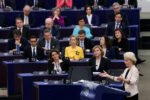As tensions rise between Iran and European powers, Iranian Foreign Minister Abbas Araghchi has warned that if European nations re-impose sanctions, Iran could pursue nuclear weapons. This statement comes ahead of critical talks with France, Germany, and the United Kingdom, who have expressed concerns over Iran’s nuclear activities.
In an interview with The Guardian, Araghchi highlighted that the joint declaration signed by Iran and the European powers in May 2023, aimed at addressing nuclear energy cooperation, has not yet resulted in any meaningful progress. The European trio, allied with the U.S., recently condemned Iran’s alleged lack of cooperation with the International Atomic Energy Agency (IAEA) during a meeting last week.
In retaliation, Iran announced it would activate “new advanced centrifuges” for uranium enrichment, essential for its nuclear program. However, Araghchi reassured that Iran remains open to dialogue, defending its right to peaceful nuclear energy use. Despite this, Western countries suspect Iran’s nuclear ambitions may extend to developing weapons.
“Iran is debating whether the religious decree against nuclear weapons was a mistake,” Araghchi said, referring to a fatwa issued by Ayatollah Ali Khamenei, which prohibits the use of atomic weapons. However, Araghchi warned that if sanctions are reinstated by Europe, it could shift domestic opinion, effectively ending the country’s longstanding opposition to nuclear arms.
Iran’s stance has evolved since the U.S. pulled out of the 2015 nuclear agreement, known as the Joint Comprehensive Plan of Action (JCPOA), a deal that provided sanctions relief in exchange for Iran limiting its nuclear program. Since then, Iran has significantly increased its uranium stockpiles and enriched uranium beyond agreed-upon limits. Currently, Iran enriches uranium to 60%, far above the JCPOA cap of 3.67%, though short of the 90% threshold required for nuclear weapons.
The Iranian Foreign Minister’s remarks signal a critical juncture for the nuclear talks. While the 2015 agreement remains a key element in ongoing discussions, its future remains uncertain with the expiration date looming in October 2025. Iranian officials are aiming to avoid a “double catastrophic” scenario where the U.S. intensifies its “maximum pressure” policy while European sanctions complicate their diplomatic standing.
Meanwhile, the Iranian government insists that its nuclear activities are for peaceful purposes, and Araghchi reiterated that Iran does not intend to enrich uranium beyond the 60% threshold. However, this level of enrichment is still far from the 90% required to create nuclear weapons, which the West remains wary of despite Iran’s assurances.
As the situation evolves, the upcoming negotiations in Geneva with the European Union’s top diplomat, Enrique Mora, and the potential return of U.S. President Donald Trump to office in the coming months will significantly impact the future of Iran’s nuclear program. Iran hopes to regain favor with European nations while maintaining a firm stance against external pressures.







